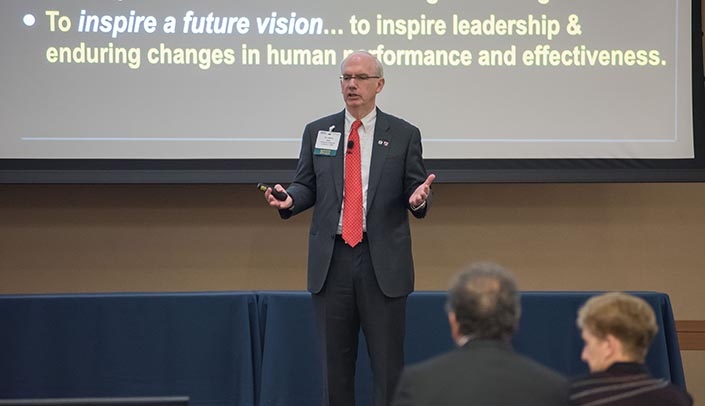In 1977, two Boeing 747 passenger jets collided on a foggy runway in Tenerife, Spain, killing 583 people and becoming the deadliest accident in aviation history.
“That was a wakeup call to the commercial aviation industry,” said UNMC Chancellor Jeffrey P. Gold, M.D., and it sparked a culture change that increased safety from one death per million miles in 1977 to one death per billion miles in 2015.
Simulation, Dr. Gold said, played a significant role in enhancing aviation performance and safety, and can do the same for health care education.
This week, UNMC hosted the two-day National Modeling & Simulation Coalition national meeting, which focused on the use of experiential learning to improve human performance and effectiveness in health care.
“This is the time to focus on advanced simulation and modeling,” Dr. Gold said in his keynote address as he highlighted UNMC’s iEXCEL initiative and construction of the Davis Global Center, set to open in 2019, to 125 attendees from across the country.
After the Tenerife tragedy, commercial aviation embraced a culture change that included advanced simulation and self-reporting, Dr. Gold said. “Contrast that to where we are in medicine,” he said, noting how clinical care is a balance between human performance and system performance. Both, he said, represent a culture and an approach to quality and safety that are built by people.
“When it’s your child or your parent in the operating room, you don’t really care whether the system or the individual insures a successful procedure,” he said. “You want to be sure that the quality and safety of that interaction is as high as possible.”
Experiential learning can enhance both systems, he said, enabling health care professionals to go beyond rote lectures and the age-old “do one, see one, teach one” philosophy. Instead, trainees will have greater opportunities to engage, interact and master knowledge, skills and procedures long before seeing, and caring for, patients.
Studies show that actively involving students in their education yields a 75 percent to 90 percent retention rate, well beyond traditional lecture models that garner a 5 percent retention rate, Dr. Gold said.
“Technology is only as good as the curriculum, pedagogy and assessment developed by experienced faculty,” he said, which is why “we want to use experiential learning as the core and build the traditional learning around it.” The Davis Global Center, he said, represents a new philosophical approach to doing just that.
One of the other keynote speakers, Daniel Serfaty, CEO of Aptima, a human-centered technology firm in the Boston area, said, “We need to make machines our friends because they are a different kind of intelligence. They develop very fast, and it’s almost like having a new species at the table in a sense.
“It’s not — ‘Oh, technology’s going to take over and therefore there won’t be any roles for the humans.’ On the contrary, the humans who are going to win, who are going to survive and thrive are the ones who are going to be able to work with artificial intelligence and technologies.”
